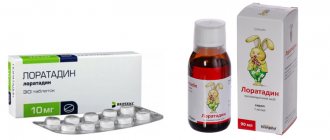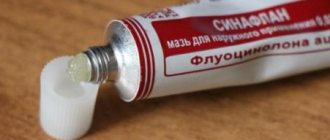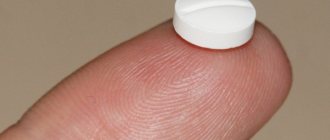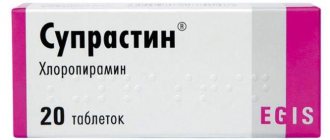Release form and composition of Erius
The drug is available in the form of film-coated blue tablets and in the form of a transparent orange syrup, the main active ingredient of which is desloratadine.
The excipients are:
- in tablets - calcium hydrogen phosphate dihydrate, microcrystalline cellulose, talc, corn starch; The tablet shell contains: white and carnauba wax, lactose monohydrate, titanium dioxide, hypromellose, macrogol, blue aluminum varnish;
- in syrup - anhydrous citric acid, sorbitol, propylene glycol, sodium citrate dihydrate, sucrose, sodium benzoate, disodium edetate, flavoring, yellow dye, purified water.
How to take and dosage for children
Unfortunately, you can easily buy this drug in a store and start using it yourself. Unfortunately, because many parents do not understand technology and dosage. This information will help many in the future to correctly provide doses of the drug for their child.
For children aged from two to twelve years, this drug is intended exclusively in the form of syrup. From two to six years, this syrup is recommended in a dosage of 2.5 ml. At the age of 6 to 12 years, this amount doubles and reaches 5 ml.
As for the duration of taking this course, only a doctor can determine this. Parents themselves should not be flattered in this matter. In the event that an allergic type reaction was carried out in a single manner, the drug can be used until all symptoms finally disappear.
Pharmacological action of Erius
Erius is a long-acting antiallergic agent that blocks peripheral histamine H1 receptors. The main active ingredient of the drug is desloratadine - the primary active metabolite of loratadine, which inhibits allergic reactions, including the release of cytokines, including interleukins, the release of chemokines, the production of superoxide anions, chemotaxis and adhesion of eosinophils, the release of P-selectin, IgE, leukotriene C4, prostaglandin D2 .
Thanks to this, allergic reactions are prevented and alleviated.
Erius has antipruritic and antiexudative effects, reduces capillary permeability, prevents spasm of smooth muscles and the development of edema.
The drug does not affect the central nervous system, has almost no sedative effect, and does not prolong the QT interval.
Erius begins to act half an hour after administration, its effect continues throughout the day.
Pharmacological properties of the drug Erius
Desloratadine is a selective blocker of peripheral histamine H1 receptors that does not have a sedative effect. Desloratadine is the primary active metabolite of loratadine. In preclinical studies of desloratadine and loratadine, no qualitative or quantitative differences in the toxicity of the 2 drugs at comparative doses (taking into account the concentration of desloratadine) were identified. After oral administration, Erius selectively blocks peripheral H1-histamine receptors and does not penetrate the BBB. Numerous studies have shown that in addition to antihistamine activity, Erius has antiallergic and anti-inflammatory effects. It has been established that Erius inhibits a cascade of various reactions underlying the development of allergic inflammation, namely:
- release of pro-inflammatory cytokines, including interleukins (IL): IL-4, IL-6, IL-8, IL-13;
- release of pro-inflammatory chemokines such as RANTES;
- production of superoxide anion by activated polymorphonuclear neutrophil granulocytes;
- adhesion and chemotaxis of eosinophilic granulocytes;
- expression of adhesion molecules such as P-selectin;
- IgE-dependent release of histamine, prostaglandin D2 and leukotriene C4;
- acute allergic bronchospasm in animal studies.
In clinical studies, daily intake of Erius at a dose of up to 20 mg for 14 days was not accompanied by statistically significant clinically significant changes in the cardiovascular system. Its use at a dose of 45 mg/day (9 times higher than the therapeutic dose) for 10 days did not cause an increase in the QT . Erius does not penetrate the BBB. When used at the recommended dose of 5 mg, the incidence of drowsiness did not exceed that in the placebo group. In clinical studies, Erius had no effect on psychomotor reactions when taken at a dose of up to 7.5 mg/day. Pharmacokinetics. Desloratadine is determined in blood plasma within 30 minutes after administration. The maximum concentration in the blood plasma is reached after 3 hours, the half-life is on average 27 hours. The degree of accumulation of desloratadine corresponds to its half-life (about 27 hours) and the frequency of use (1 time per day). The bioavailability of desloratadine is proportional to the dose, ranging from 5 to 20 mg. Desloratadine is moderately (83–87%) bound to plasma proteins. When used at a dose of 5–20 mg once a day for 14 days, no clinically significant accumulation of the drug was detected. When conducting cross-comparative studies with the same dose of the drug, the bioequivalence of the drug in the form of tablets and syrup was proven. The results of the studies showed that desloratadine does not inhibit CYP 3A4 or CYP 2D6 and is neither a substrate nor an inhibitor of P-glycoprotein. A single dose of desloratadine 7.5 mg with food (a high-fat, high-calorie breakfast or grapefruit juice) did not affect the distribution of desloratadine.
Contraindications to the use of Erius
According to the instructions, Erius is not prescribed:
- in the presence of hypersensitivity to the components included in the drug;
- hereditary diseases such as glucose/galactose malabsorption, sucrase/isomaltase deficiency, fructose intolerance, since the syrup contains sucrose and sorbitol;
- during pregnancy and lactation;
- under one year of age (syrup);
- under 12 years of age (tablets).
Erius should be used with particular caution in severe renal failure.
Instructions for use of Erius, dosage of syrup and tablets
Do not chew the tablet, take it with plenty of water. The drug is taken regardless of the time of meal. The duration of use is determined by the course of the disease and its severity.
The standard dosage for adults and children over 12 years of age, according to the instructions for use, is 1 Erius 5 mg tablet once a day. It is recommended to take at the same time.
When treating an intermittent form of allergic rhinitis, the drug is stopped when the symptoms subside and resumed when they reappear.
For persistent rhinitis, continuous treatment may be prescribed (for the entire period of patient contact with the allergen).
Instructions for Erius syrup
The standard dosage for adults and children over 12 years of age is 10 ml of syrup once a day.
Dosages of Erius syrup for children:
- from 6 to 11 months – 1 mg (2 ml),
- from 1 year to 5 years – 1.25 mg (2.5 ml),
- from 6 to 11 years – 2.5 mg (5 ml) 1 time per day.
Taken orally regardless of food.
Side effects
The instructions warn about the possibility of developing the following side effects when prescribing Erius:
- headache (2%),
- sometimes - dry mouth, increased fatigue, allergic (rash) and anaphylactic reactions.
When taking syrup, children under 2 years of age may experience insomnia, diarrhea, and increased body temperature. Children over 12 years of age may experience increased fatigue, headache, and dry mouth.
Contraindications
Erius is contraindicated in the following cases:
- hypersensitivity to any of the substances included in the drug or loratadine;
- pregnancy and lactation;
- children under 6 months - for syrup; up to 12 years - for tablets;
- hereditary fructose intolerance, glucose-galactose malabsorption or sucrase-isomaltase deficiency - for syrup (due to the presence of sucrose and sorbitol in the composition).
Carefully:
- severe renal failure.
Overdose
Taking a dose 5 times the recommended dose did not result in any symptoms. In clinical trials, daily use of desloratadine in adults and adolescents at a dose of up to 20 mg for 14 days was not accompanied by statistically or clinically significant changes in the cardiovascular system.
In a clinical pharmacological study, the use of desloratadine at a dose of 45 mg per day (9 times higher than recommended) for 10 days did not cause prolongation of the QT interval and was not accompanied by serious side effects.
If you accidentally ingest a large amount of the drug, you should immediately consult a doctor. Gastric lavage and activated charcoal are recommended. If necessary, symptomatic therapy.
Desloratadine is not eliminated by hemodialysis; the effectiveness of peritoneal dialysis has not been established.
Side effects of Erius
According to reviews, Erius may have side effects.
Tablets: cardiovascular system: palpitations, tachycardia.
Digestive system: increased activity of liver enzymes, increased bilirubin levels.
Allergic reactions: rash, anaphylaxis.
When taking Erius tablets, the following were also noted: dry mouth, increased fatigue, headache.
Syrup: under 2 years of age – fever, diarrhea, insomnia.
In adolescents and adults: dry mouth, increased fatigue, headache.
Rarely, side effects such as drowsiness, dizziness, palpitations, tachycardia, nausea, vomiting, diarrhea, abdominal pain, dyspepsia, increased levels of bilirubin, liver transaminases, urticaria, rash, anaphylaxis, itching, angioedema were observed.
Contraindications and possible side effects
First of all, parents should remember that this remedy should not be used to treat children who have not yet turned one year old. This is justified by the fact that for patients in this age group the effect of the drugs is not yet fully clear. Contraindicated cases of taking the drug for adults include pregnancy in women and breastfeeding. As for children, in case of renal failure it is better not to use the drug. But there are exceptions when the drug is introduced into the body, but in the presence of a doctor.
We recommend: Amoxicillin for children instructions
It is strictly forbidden to use this drug for children who have hereditary diseases or abnormalities. In this case, we are talking about genetic intolerance to fructose, a violation in the process of absorption of certain substances, as well as genetic deficiency of sucrose. This is justified by the fact that the syrup contains sucrose in considerable quantities.
There are options so that there is a specific individual intolerance to this drug. In a minimal number of cases, it happens that Erius syrup does not help or causes additional manifestations of an allergic reaction. If your child nevertheless becomes an exception, then he needs to stop giving this syrup.
There is a possibility of so-called sedative effects. In this case, drowsiness is implied. For extremely young children, there is a risk of digestive system disorder, which is accompanied by abdominal pain, nausea, vomiting and diarrhea. If the dosage of the drug is carried out correctly, then the likelihood of side effects is zero.
special instructions
The safety and effectiveness of using Erius syrup under the age of one year has not been established.
Rhinitis in childhood (less than 2 years) is usually caused by infection. No studies have been conducted to determine the effectiveness of the drug in infectious rhinitis.
Determining the nature of rhinitis (allergic or other origin) in children under 2 years of age is quite difficult. When making a differential diagnosis, it is necessary to take into account the presence of abnormalities of the upper respiratory tract and foci of infection, the results of laboratory tests and skin tests, and anamnesis.
When taking the drug in doses prescribed by the instructions, Erius does not affect the level of concentration and speed of reactions, and, therefore, the ability to control mechanisms.
What are the features of the action of Erius
Erius is the newest antihistamine drug that is prescribed in therapy for the treatment of allergic pathologies in both children and adults.
It has a small list of side effects, which in turn reduces the reasons for which it is contraindicated. Antihistamines, including Erius, exhibit quite active antiallergic effects that have a detrimental effect on histamine and other substances that cause allergic reactions. The therapeutic effect of Erius begins to appear within 30 minutes after its use, and its protective properties last for 24 hours.
The unique properties of this medicine include the fact that it is not able to cross the blood-brain border, does not affect the brain, and does not provoke side effects such as drowsiness, impaired motor coordination and attention problems.
Erius is used to treat certain diseases:
- Allergic conjunctivitis.
- Runny nose of allergic origin.
- Chronic or acute urticaria.
- Allergic reaction to insect bites.
For the above diseases, the medicine can be used without a doctor’s prescription, but it will be better if you get competent advice from a specialist.
It must be emphasized that if the patient suffers from bronchial asthma, then many antihistamines for this disease are contraindicated and their use for treatment is not recommended.
Pregnant women are prescribed those medications whose effects have been studied not only in laboratory conditions, that is, on animals, but have also passed all the necessary tests in clinics, in which no toxic or teratogenic effect on the fetus was found. In other words, the drug is not capable of provoking the development of various anomalies in the unborn child.
During lactation, this drug is also not prescribed to nursing mothers due to its ability to pass into breast milk. In another option, when Erius is still recommended for treatment for a woman who is breastfeeding, it is necessary to temporarily stop breastfeeding.
Some pregnant women who are prone to allergies already know about the peculiarities of their body’s reaction to certain foods or substances. The appearance of unpleasant symptoms during contact with allergens, as a rule, is not a surprise for them.
However, some women encounter such problems for the first time when carrying a baby. This is due to the activation of the immune system during pregnancy. The body's defense system works in enhanced mode, so it can react unexpectedly to certain substances. The most common irritants that cause allergies are:
- house dust;
- some plant species and their pollen;
- pet hair and excretions;
- medications;
- Food;
- nutritional supplements;
- cosmetics;
- Sun rays;
- cold.
Allergy symptoms may not always appear. Factors that provoke the appearance of characteristic responses of the body include:
- stressful situations;
- self-medication with medications;
- constant contact with household chemicals;
- the presence of a large amount of synthetic clothing in the wardrobe;
- low-quality cosmetics;
- poor nutrition;
- eating a large number of foods that are potential allergens (citrus fruits, berries);
- bad ecology.
Allergic reactions in pregnant women may differ depending on the location of the irritation. Experts identify the following types of allergies:
- Rhinitis. This type of allergy is manifested by a large amount of mucous or watery discharge from the nose, paroxysmal sneezing, and a feeling of itching in the nasal passages. Rhinitis often occurs in response to plant allergens, dust or wool. Sometimes such symptoms appear during toxicosis in pregnant women. For rhinitis, nasal drops are usually prescribed.
- Conjunctivitis. Irritation is localized in the eye area, redness of the cornea occurs, sensitivity to light increases, and tears constantly flow. Typically, the symptoms of rhinitis and conjunctivitis appear in combination.
- Skin rashes (dermatitis, urticaria). An allergic reaction appears on the skin. There is redness and swelling of the skin in the area that was exposed to the allergen.
- Quincke's edema. The body's rapidly developing response to an allergen, which causes swelling of the lips, tongue, eyelids, can affect the larynx and trachea. In severe cases, respiratory function is impaired. Sometimes the swelling spreads to the joint tissue, causing difficulty in movement.
- Anaphylactic shock. Severe manifestation of allergies, which is accompanied by a decrease in blood pressure and impaired consciousness. This allergy develops quickly and requires immediate medical attention.
Antihistamines relieve allergy symptoms, but do not cure the disease itself. During pregnancy, doctors do not recommend using complex medications.
It is better to opt for topical medicinal substances: ointments, gels, drops in the nose and eyes. However, this type of medication can be ineffective, so in some cases pregnant women have to use more effective medications. Some of these medications negatively affect the development of the fetus, so before taking this or that pill, you need to read the instructions and consult with your doctor.
In 1st trimester
During the first three months, the main organs and systems of the fetus are formed and formed. This period is the most crucial, since disturbances that occur in the baby’s development at this stage can lead to congenital defects and anomalies.
In the 1st trimester, the expectant mother often suffers from toxicosis, which may be accompanied by allergic reactions. Assessing the risk of negative consequences for the child, doctors prefer not to prescribe medications to relieve allergy symptoms in a pregnant woman. If the condition of the expectant mother becomes severe or her life is in danger, then in the early stages you can take Parlazin, Telfast, Cetirizine, Claritin, Zodac or Zyrtec. However, they are not absolutely safe for the fetus.
In the 2nd trimester
The 2nd trimester is considered less dangerous for the baby developing in the womb. It is protected by a fully formed placenta. If the allergist insists on the use of antihistamines, then the mother can be treated with their help in case of extremely poor health caused by an allergic reaction.
Some chemical compounds enter the systemic bloodstream and can affect the child, so medications are used in exceptional cases. Usually doctors give preference to Loratadine, Zodak, Claritin and Cetirizine, and in severe cases they may prescribe Chloropyramine or Suprastin, although their use during pregnancy is prohibited.
In the 3rd trimester
In the 3rd trimester, if necessary, the doctor prescribes the safest anti-allergy medications for the fetus. At this stage, it is possible to use Claritin, Azelastine or Chloropyramine. However, before the planned date of birth, any antiallergic medications should be discontinued. This is explained by the risk of respiratory depression in the newborn.
Allergy symptoms are always unpleasant and cause a lot of inconvenience. However, in most cases, they are tolerant. Nature itself made sure that during the period of gestation it would be easier for a woman to endure this disease. The body of a pregnant woman produces a powerful natural antihistamine - the hormone cortisol, which, although not stopping the allergic reaction, can significantly reduce the severity of its symptoms.
Often during pregnancy, the nature of the allergic reaction changes: some lucky women note a decrease in the intensity of allergic manifestations, while others, on the contrary, experience an exacerbation of the disease. There are cases when a woman experiences allergic symptoms for the first time during pregnancy. Some women stop feeling their allergies altogether.
Preventive measures to avoid allergic reactions during pregnancy are very simple - avoid contact with possible allergens. The prevention scheme is as follows:
- Remove all flowering plants from the room and limit contact with pollen (do not smell the flowers).
- Constantly ventilate the room and put mosquito nets on the windows.
- Contact with household chemicals should be completely avoided. If there is an urgent need to use it, you should put gloves on your hands and put on a gauze bandage so as not to inhale chemical fumes.
- Have less contact with pets.
- Get rid of bad habits. Smoking during pregnancy can cause serious swelling of the nasopharynx.
- Try to avoid visiting beauty salons, dyeing your hair and doing nail extensions.
- Anxiety and stress can also trigger the development of allergies. Surround yourself with positive emotions.
Important! During pregnancy, it is necessary to regularly wet clean the room, because dust is the main carrier of allergens and contributes to the development of respiratory diseases.











